- Home
- Aaron Allston
Five by Five Page 5
Five by Five Read online
Page 5
No, the security humans weren’t gone. They were meters away, choking and vomiting, many of them feeling their way along the walls, some shouting into their hand and lapel radios.
Blind, of course, tears streaming from their suddenly puffy eyes. There was stuff in that smoke that smelled bad to ’gangers but inflamed meat people’s mucous membranes like nobody’s business. A couple of the meats produced sidearms and took bat-blind shots in the direction of the chopper-hauler, but they were shouted down by more sensible but equally blind superiors.
You’ve probably seen the recordings from that day. With speed and discipline, the ’gangers finished hooking our cables to the cargo container. I eased the chopper-hauler up into the air, checking the demands made by its weight on my rotors. They took the load exactly as I knew they would. And with care suited to carrying the most precious object in all the universe, I turned us northward and headed out over the forest.
* * *
We were only twenty kilometers north, still being seen and reported by meats in their cabins and logging camps, when BeeBee reported two blips incoming from General Millfield Base. The speed of the blips made it a near-certainty that they were weapons platforms.
A chopper-hauler full of forklift megas with low-tech weapons is no match for a weapons platform. Picture a circular plate of ducted-fan motivators; at its center is a spherical fuselage packed with weapon systems. Real ones like rockets and autocannons. These craft would be on us in moments. Because of the value of our cargo, they might not shoot us, but they could easily force us down.
Except … their commander and pilots were too eager, too confident. They came on in a straight line directly from the base.
And they flew over Intercept Point Alpha, a broad field north of Zhou City. Where we had claymore cannon trailers set up.
Our gunners plotted the weapons platforms’ locations and courses by eye, cranked those cannon barrels around to aim them, and triggered the cannons in sequence, filling the sky with shrapnel.
We have recordings of that, too. Both vehicles began issuing smoke and plummeted. The pilot of one ejected. The other pilot tried to hold it together for a landing. She did okay, scoring a trench in the big field, not rolling her platform, leaving it repairable. The news media later said she had shrapnel damage to both legs and her pelvis, but she lived.
All I knew at the time was that the weapons platforms dropped off our passive radar. I changed course and struck off northwest.
–7–
Chopper
We were a hundred and sixty klicks out from Zhou City when the chopper’s diagnostic readouts began lighting up red. I glanced at them, toggled my intercom. “What is it, BeeBee?”
BeeBee offered a couple of swear words I’d only ever heard humans use. Then: “Angle of attack’s not … right. We’re losing lift.”
“Did we take a hit when those idiots were shooting in the bay?”
“That’s probably it.”
“Can you fix it in flight?”
“Hell, no.”
“Can you fix it fast on the ground?”
“… Probably.”
“Great.”
At this point, we had the meats blind with their mapping satellites down, but it was only a matter of time before they got some sort of observation craft launched. Enough time on the ground and we’d be spotted.
I saw a clearing big enough for our needs and descended. Gentle as a kiss, I lowered the cargo container to the irregular clearing floor and waited while the ’ganger crew detached the cables, then I sideslipped thirty meters and set the chopper down.
And while BeeBee got to work on the engine, we waited.
* * *
Twenty minutes passed, then the situation was resolved. But not with the announcement that repairs were done.
Richter sent us a wireless burst. “Incoming weapons platforms and something big, maybe another chopper-hauler. Get clear. I say again, get clear.”
Yeah, I got clear. I threw open the pilot’s hatch and leaped free. Understand, megas aren’t all that well-suited for leaping and landing, but I managed to keep mine on both legs, with yellow flashes but no red lighting up my diagnostics, when I hit the ground. I straightened and ran toward the cargo container. Behind me, the chopper’s side door rolled open and the megas, vehicles, and individual ’gangers inside came roiling out like upset wasps.
Just in time, too. There was a noise like distant drums being beaten by overcaffeinated musicians and then two more weapons platforms roared into view over the clearing edge. The lead one flashed by harmlessly, but the second platform opened fire, putting a burst of high explosive armor-piercing rounds into the chopper.
I saw the armor all along the starboard side pucker and disintegrate, saw sparks erupt from the forward engine as it ceased to be recognizable as machinery. One of the forward rotor vanes snapped off entirely.
The chopper was dead. I gulped.
Memnon, in one of the forklift megas, traversed to track the weapons platforms on their outbound path. He aimed and the globe-launcher affixed to his arm triggered with a loud “chuff” noise. I saw the black globe arc up after the weapons platforms, gaining on them, dropping toward them from above—then it detonated.
One of BeeBee’s fuel-air bombs. That whole quadrant of sky filled with fire. A shockwave of noise and pressure hit us, knocking ranks of ’gangers off their feet. I struggled to keep my vehicle upright.
The two weapons platforms, shattered, spun out of the sky and slammed into the forest floor west of us.
And that was it, the first two kills of the Dollganger War of Independence, Phase One. I saw ’gangers, those still on foot, stare at each other, their expressions changing as the enormity of what had just happened hit them.
We gathered around the cargo container, preparing to meet the force we knew was coming.
* * *
Minutes later, the forward edge of the human ground force let us know they were there. A few men and women, infantry, in camouflage gear, body armor, and visored helmets, appeared at the verge of the forest. We knew there had to be many more farther back.
These troops weren’t carrying firearms, not normal ones. They had rifle-length zappers. Crowd control and suspect capture weapons, they ionized a channel of air between weapon and target, then projected electricity along that channel. Humans hit by those beams would spasm and fall down. So would ’gangers—rebooting after a light dose, staying down until externally revived after a heavy hit.
These troopers had regular firearms, too, long arms across their backs or sidearms holstered. They wouldn’t use those weapons on any target near the ComFab. But a zapper wouldn’t do anything to a ComFab except maybe require a reload of programming.
One of the troopers, a tall dark-skinned woman, raised a small tablet to her lips. Her voice emerged amplified. “This is Colonel Hayes of the Chiron Defense Force. Throw down your weapons and lie face-down on the ground or we will open fire.”
The response, a wireless burst from Richter, intended for us and not the humans, came immediately: “Stage Two, go.”
All four sides of the cargo container fell away, slamming to the earth, missing the ’gangers all around—aware of what was coming, they were far enough away to be safe. The action revealed the container’s contents.
There was no ComFab inside. There were more megas. Dollgangers, both on foot and in buggies. At the center of the container was an armored cube a meter on a side. It housed radio jamming equipment, which had fired up the instant Richter issued his command. Our radios suddenly hissed with static.
* * *
Let’s go back in time to when the smoke bombs went off in Bay 16.
The only video of what went on show roiling smoke. But there are also fuzzy monochrome views from imaging radar units used by Richter’s crew.
While the humans staggered around blind, Richter and his crew charged up to the trailer and ComFab container, climbed, attached winches to the top, and undogged the
two long sides of the container. The winches lowered them to the pavement. Meanwhile, a similar crew with similar gear atop the cargo container on the nearest parked hauler-trailer, which I had placed there days before to wait for a “repair job,” lowered the long sides of its cargo container.
Forklift megas arriving from Bay 4 flanked the ComFab, lifted it, maneuvering it free of the container, then delicately rolled it over to the other trailer, placing it within. The crew on that trailer winched up and dogged down the sides. Those sides were radio-shielded so transponders in the ComFab wouldn’t give away the unit’s real position. That crew hid in the container and the cab of the hauler.
The forklift megas and all the rest of the support personnel assembled in the ComFab’s original container. Richter’s crew winched the sides up and dogged them in place. The alarms and sirens helpfully provided by the Harringen Corporation covered the sound of all these activities.
So when my chopper-hauler arrived and blew the smoke away, everything looked the way people expected. Harringen’s cameras witnessed the aerial departure of the ComFab container and security personnel giving chase. They also recorded, but took no note of, the departure, a few minutes later, of a hauler-trailer rig.
Its driver? Scarecrow, the simulacrum robot we’d built. And in Scarecrow’s pilot’s bay sat the King. Cool and unruffled as ever, he drove the hauler out of the Harringen yard and headed south. Sure, the Harringen operations center had locked down all the bay doors, but some of those doors had been blown at the same time the smoke charges went off. They couldn’t close.
By the time the second set of weapons platforms strafed my chopper-hauler, the King was many kilometers south of Zhou City, unobserved, headed toward the Nest’s actual location… and with the mapping satellites down, the government never had aerial records to analyze. To them, the ComFab just vanished.
–8–
Meat
Which left us, the diversionary force, facing a large, determined, confused, angry unit of meats.
As the sides of the cargo container crashed down and ’gangers spilled out, Memnon launched a black globe toward Colonel Hayes and her escort. It detonated into a sphere of fire and destruction the size of a six-human-story building, the concussion nearly knocking me over.
And then the hailstorm hit, except the hail traveled laterally, some of it coming from the meats to us, some of it going out from us to the meats. It chewed to pieces whatever it struck. The noise, the roar of weapons and impacts and explosions, seemed to fill the world.
On my heads-up displays, I saw wire-frame images of human soldiers cease to be as recognizable shapes when railgun loads hit them. Megas went to pieces, torn apart by high-powered automatic-fire rifles or blown into clouds of trash by heat-seeking microrockets.
Atop the cargo container, Richter took a hit. Suddenly his torso was just gone, his arms and legs catapulting separately at missile speeds.
He wasn’t dead, though, not at that instant. I got one last microwave transmission from him: “Terminating.” That was his last word, sent in the split-second before he fried out his own cognitive processes.
In my head and in the map imager of my mega, the ’ganger-net sprang into life. If there’s anything we’re good at, it’s multiple-source coordination, and the loss of radio meant only that we were down to microwave and data-laser bursts. Every time one of us saw another, we’d automatically issue an encrypted data packet including our location, status, a repeat of current orders, alerts.… The humans could do something like that with their helmets, but each exchange took several seconds to send, decrypt, and understand. With us, it was microseconds. In the first five seconds of the firefight, as we scattered and traded licks with the meats, we built up an ever-more-detailed map of our positions, their positions, our relative numbers.
Initially, that didn’t help me much. I crouched in my mega, looking around for Lina’s forklift. She was supposed to bring me a railgun and ammo hopper.
She was nowhere in sight, and a quick check of my tac-map failed to disclose her location. Or BeeBee’s. Or Memnon’s, even though I was looking right at his mega, fifty meters away.
In fact, none of the meats showed up on my tac-map.
I felt my heart sink. There it was, final proof that the Stand-Ups meant to kill me. Without weapons, without an accurate tac-map, I was a dead, steaming mass of composites.
So I revved my treads up and headed off at an angle for a line of trees where I hadn’t seen any meats.
My mega rocked and dinged as a spray of gunfire from some human stitched it. Red lights appeared on the diagnostics readouts, but none were crucial yet.
To my right, a seemingly-unpiloted ’ganger buggy bounced across uneven ground and rolled into the midst of a group of soldiers behind tree cover. It detonated, hurling some of the soldiers out, blanketing others in smoke and fire.
I got behind the first few trees. They seemed to offer damned little cover.
Our extraction muster point was a kilometer north of our landing site. Our transportation was there already. There had been no engine failure on the chopper-hauler, no impromptu choice of a clearing to land in—the location had been chosen weeks before, its intricacies loaded as three-dimensional schematics in our memories. We knew where every tree, every rock, every rodent hole within a kilometer was. I skirted the edge of the forest, heading for the muster point.
Memnon’s voice came to me in a microwave burst, “Fall back, extract.” He didn’t sound troubled. I wondered if he was a sociopath.
And I ejected.
* * *
No, I didn’t intend to. As the rocket acceleration of the ejector seat held me in place, I realized what must have happened.
I’d been all over my mega, looking for whatever means the other Stand-Ups would use to eliminate Big Plush from their vision of a better tomorrow. I’d never found one and had assumed that they were going to make a direct attack on me at some point.
It hadn’t occurred to me—just a little extra programming in an obscure corner of the mega’s operating system would do the trick. When it received the fall-back code, it had only to eject the pilot. Even if I got back to my mega, it was disabled—there would be no way to pilot it.
I reached the apex of my ejection arc and began to drop. The seat’s parachute deployed. Then a bullet hole, round and neat, appeared in the shroud above my head.
I looked down. There were at least two infantrymen firing up at me. Only being a small moving target had saved me from being slaughtered.
I was maybe ten meters up from the tallest of the treetops and descending fast. In moments, my parachute would catch on a branch and I’d dangle there, an easy target. Before that happened, I unbuckled and jumped free.
I grabbed at the first branch to come to hand, snapped it off under my weight, kept falling. But the next branch down was hardier. I slammed into it and grabbed it, pain shot through my chest, and my claw-and-hook climbing gear caught hold. The branch swayed under my weight but did not break.
I heard meat troopers who’d lost sight of me begin shouting, trying to find me. I scrambled laterally to the tree trunk and then down to the ground.
Yeah, I know. There was something to be said for staying up in the branches and out of sight. But the fall-back command had set a timer in motion. After a few minutes, everyone at the muster point would be outbound, headed for safety. I wanted to be with them. Sure, some of the people at the muster point wanted me dead. But maybe not all of them did. Maybe …
I ran. Tree to tree, vaulting across exposed roots, ducking beneath brushy overhangs. I splashed through a stream that a human could have stepped over.
Then the human officer lunged out from behind a tree and brought his damned big foot down on me.
* * *
And that should have been it. Like I said before, he’d hold me there while he got his sidearm out, then lift his foot and shoot me until I was dead.
Except … I reactivated the climbing gear.
I deactivated the foot-and-knee climbers. The lower half of my body swung free. I dropped, fell maybe a third of a meter, landed on my feet. I ran—right up to his support leg.
I reactivated the climbing gear and scampered up his inseam, clawing out chunks of bloody meat as I went.
He shrieked. He brought his other foot down. He grabbed at me with his free hand. But I was already farther up, digging gouges out of his butt, scrambling up his armored side, all the way to his neck.
Understand, this is not something that fills me with pride or a sense of accomplishment. In a moment, one of us would be dead and one alive, and I wanted to live. So I kept the claw-and-hook gear extended, I grabbed, I cut, I tore … all where I knew the carotid artery was.
Then, from head to waist, I was drenched in sticky warm liquid that hit me under pressure. I jerked my head from side to side to clear my eyes. I could see his own eye, his right one, as it rolled up in his head.
And he fell. I leaped free, rolled as I hit the ground—in a world where almost everything is built to a giant scale, ’gangers learn how to land. I came up on my feet.
And there he was, twitching, a dead meat person.
It wouldn’t be much later in the War of Independence before ’gangers who killed meats in direct conflict would come to be referred to as jacks, a term of somber respect. The term comes from a human children’s story, Jack the Giant Killer. At that moment, I became the very first jack—another of my dubious achievements in the historical chronicles.
But all I knew at that moment was a crushing weight of grief. Looking at the dead man, I couldn’t move. My eyes burned, and a noise, an animal howl, escaped me.

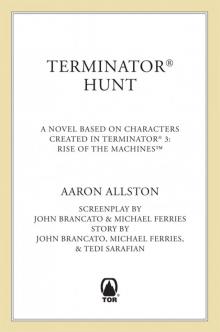 Terminator 3--Terminator Hunt
Terminator 3--Terminator Hunt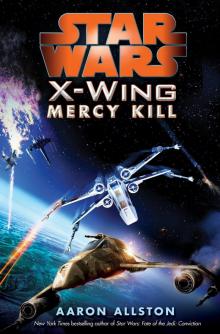 Mercy Kil
Mercy Kil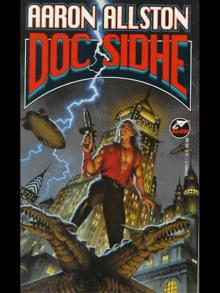 Doc Sidhe
Doc Sidhe Star Wars: Fate of the Jedi: Outcast
Star Wars: Fate of the Jedi: Outcast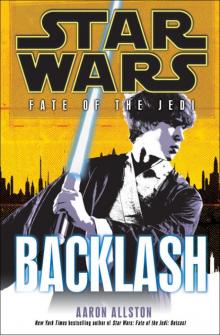 Fate of the Jedi: Backlash
Fate of the Jedi: Backlash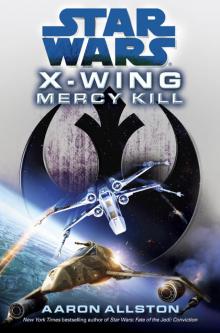 Mercy Kill
Mercy Kill Rebel Stand
Rebel Stand Wraith Squadron
Wraith Squadron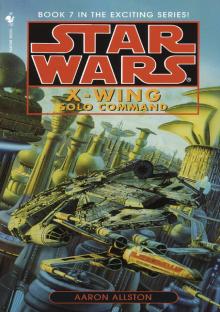 Star Wars: X-Wing VII: Solo Command
Star Wars: X-Wing VII: Solo Command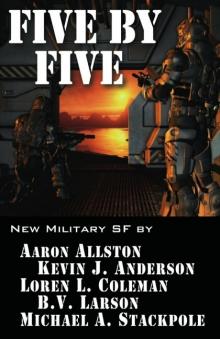 Five by Five
Five by Five Solo Command
Solo Command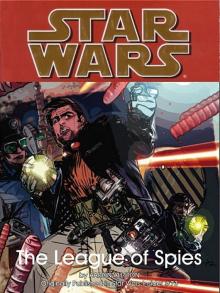 Star Wars: The Clone Wars Short Stories: The League of Spies
Star Wars: The Clone Wars Short Stories: The League of Spies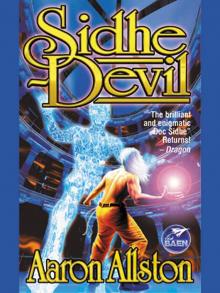 Sidhe-Devil
Sidhe-Devil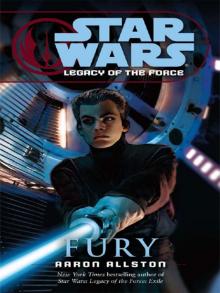 Star Wars: Legacy of the Force: Fury
Star Wars: Legacy of the Force: Fury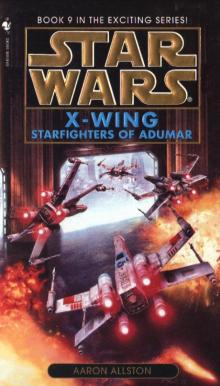 Starfighters of Adumar
Starfighters of Adumar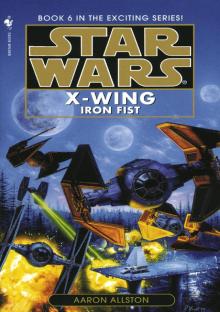 Star Wars: X-Wing VI: Iron Fist
Star Wars: X-Wing VI: Iron Fist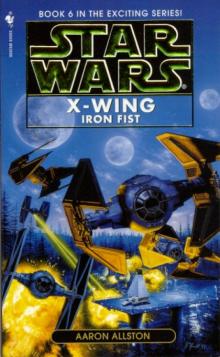 Star Wars - X-Wing - Iron Fist
Star Wars - X-Wing - Iron Fist Exile
Exile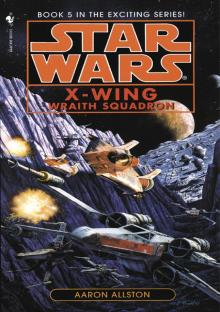 Star Wars: X-Wing V: Wraith Squadron
Star Wars: X-Wing V: Wraith Squadron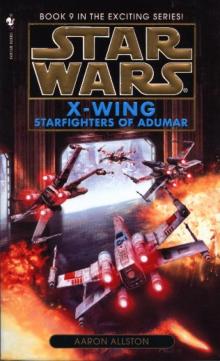 Star Wars - X-Wing - Starfighters of Adumar
Star Wars - X-Wing - Starfighters of Adumar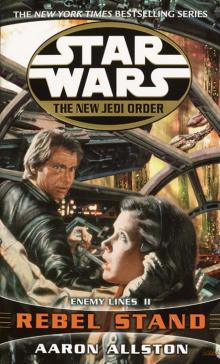 Rebel Stand: Enemy Lines II
Rebel Stand: Enemy Lines II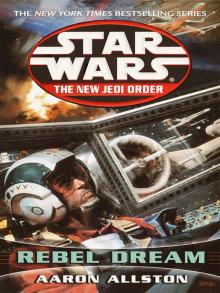 Rebel Dream: Enemy Lines I
Rebel Dream: Enemy Lines I Outcast
Outcast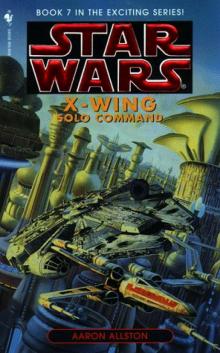 Star Wars - X-Wing 07 - Solo Command
Star Wars - X-Wing 07 - Solo Command